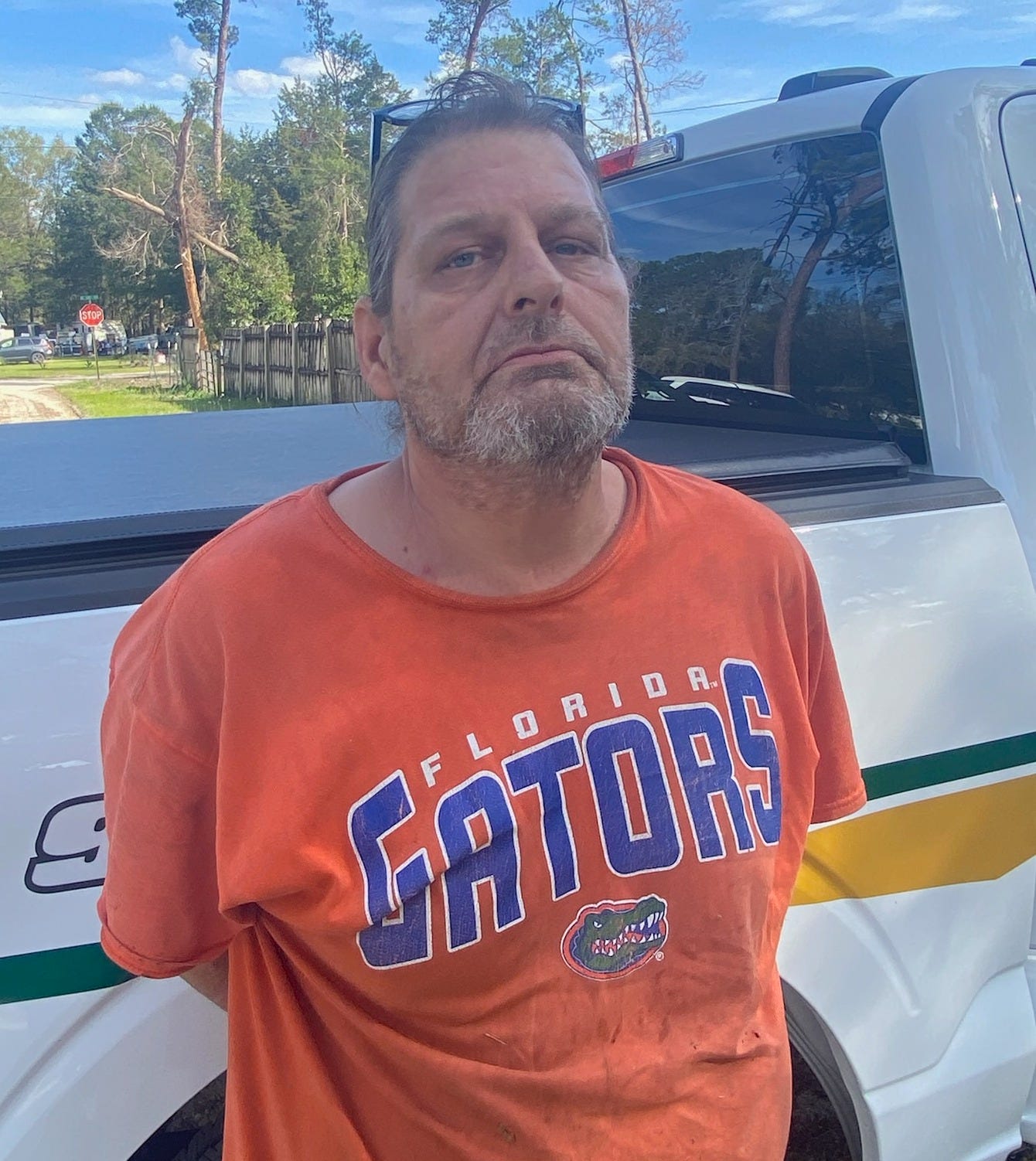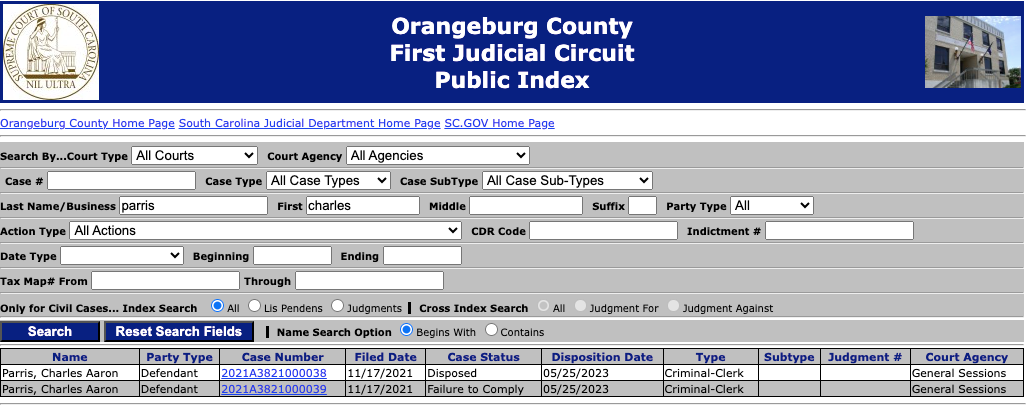I scooped the arrest of Charles Aaron Parris for alleged bomb threats—Here’s why I held the story
Balancing speed and ethics in journalism when public safety is at stake
Producing high-quality, in-depth news takes significant resources. At Lake Lure News / Cops & Congress, facts come first, followed by in-depth commentary and analysis. Your subscription helps support independent journalism that brings you closer to the decisions shaping the community and ensures I can continue delivering the stories that matter most.
Situational awareness: An exclusive, or scoop is an important news story that is first reported by a journalist. This goes beyond breaking news when no other journalists are known to be reporting on an important issue.
News & Commentary
RUTHERFORD COUNTY, N.C. — I had the scoop Friday morning. Before most people knew, before the Forest City police department issued a public statement, and before other media outlets could confirm it, I had verified that Charles Aaron Parris was the bomb threat suspect from the past week’s multiple bomb threats, according to my law enforcement sources.
In journalism, speed is everything. Breaking a story first establishes credibility, earns public trust, and sets the tone for broader media coverage. Reporters compete fiercely to get the story out before anyone else, and I have built my career on being ahead of the curve, breaking stories others don’t yet know exist.
But sometimes, being first isn’t the most important thing.
I made the rare but necessary editorial decision to hold this story because there were serious concerns—for Parris himself, for the officers making the arrest, and for the broader public safety implications of releasing details before the situation was fully under control.
In a media landscape that often prioritizes sensationalism and speed over substance and ethics, I believe this case serves as a reminder of what responsible journalism should be. Yes, it’s our job to break news. But it’s also our job to ensure that what we publish does not cause more harm than good.
The Arrest and the Details
Parris was arrested by police in Flordia. Forest City did not say which agency arrested him in their news release. My sources say he’s currently being held by U.S. Marshals. It is unclear if he will face any future extradition to North Carolina. Law enforcement sources confirmed to me that his arrest was related to serious threats made from Florida to North Carolina, and because of the interstate nature of the offense, federal authorities took the lead on the case.
Here’s what Forest City police said on March 14, 2025 at 6:10 p.m.:
“The Forest City Police Department and Rutherford County Sheriff’s Office have secured warrants for Charles Aaron Parris of Gainesville, Florida (formerly of Rutherford County) in connection with the recent bomb threats and other related incidents. Parris was developed as a suspect during the investigation and was confirmed to be responsible for these threats. He was arrested earlier today by authorities in Florida.
Incidents like this require significant law enforcement resources, pulling emergency personnel from critical duties and straining public safety resources. False threats not only cause fear and disruption but also place unnecessary risks on officers, first responders, and the public. We take these matters seriously and will continue to hold individuals accountable for making false reports and threats.
We appreciate the cooperation and patience of our community as we worked through this investigation. Additionally, we extend our gratitude to the many agencies that assisted, including the Gastonia Police Department Bomb Squad, Rutherford County Sheriff's Office, Spindale Police Department, Rutherfordton Police Department, Gaston County Sheriff's Office, Greenville County Sheriff's Office, Henderson County Sheriff's Office, Rutherford County EMS, Forest City Fire Department, Rutherford County Traffic Control, ATF, NCSBI, Rutherford County Emergency Management, U.S. Marshals Service, Gainesville Florida law enforcement, and the Tri-City Violent Crimes Task Force.”
While law enforcement has not disclosed the full extent of the threats, the involvement of federal authorities signals the gravity of the case. Federal law is very clear when it comes to threats against officials, and crossing state lines makes the charges even more severe.
Why I Held the Story
I have reported on countless arrests, public safety incidents, and law enforcement operations. I take great pride in breaking stories first—that is the very essence of being a journalist. But this case was different.
Parris is not just any suspect. Over the years, he has repeatedly contacted me with erratic, rambling messages, often making outlandish claims that had no basis in reality, with nothing I could verify independently. His accusations against law enforcement, government agencies, and even private citizens were often fueled by misinformation, conspiracy theories, and a fundamental distrust of authority. He has a criminal history according to NC state records and SC state records. As far as I could verify, they were all misdemeanors.
While much of what he said in the past was simply incoherent or legally insignificant, this time was different. This time, authorities believed his words constituted a genuine threat—one serious enough to involve federal intervention.
As I weighed my options, I asked myself:
Would releasing this information compromise the arrest or put officers at greater risk?
Could reporting too soon escalate Parris’ behavior or trigger unintended consequences?
Would holding the story for a short time allow for more accurate, comprehensive coverage that benefits the public?
For all of those reasons, I decided to wait before publishing.
The Complexity of Covering Parris
Parris has made numerous inflammatory claims online, often targeting law enforcement with bizarre, unfounded allegations. He has publicly accused officers of running surveillance programs that don’t exist, implanting tracking devices in people, and engaging in vast conspiracies that have no evidence to support them.
In one particularly concerning instance, he suggested that mental health issues were not real, posting: "So a family that has someone who hears things you can’t… think twice… it’s not ALWAYS MENTAL."
While much of what he has said in the past could be dismissed as the ramblings of an individual disconnected from reality, his actions now have real-world consequences.
It’s one thing to spread misinformation online—it’s another to allegedly make credible threats that require federal intervention.
This case is part of a larger societal issue—the intersection of mental health, misinformation, and law enforcement intervention.
Federal Charges and What’s Next
Parris is now in federal custody, facing potential charges related to interstate threats under federal law, which criminalizes transmitting threats across state lines.
The U.S. Marshals’ involvement is notable. Their task force typically handles high-priority fugitives and cases where immediate action is needed. The fact that they assisted in Parris’ arrest suggests that authorities viewed him as a serious enough threat to warrant swift federal intervention.
What happens next will depend on:
The formal charges filed against him. Federal prosecutors will determine how aggressively they want to pursue this case.
His mental health evaluation. Given his past behavior, questions may arise about whether he is fit to stand trial.
His legal defense strategy. Will he claim he was misunderstood? Will he argue that he never intended real harm?
In the coming weeks, we can expect court hearings, potential federal indictments, and a clearer picture of how authorities plan to proceed.
Why Journalism Ethics Matter More Than Ever
This case is not just about Parris—it’s about the responsibilities of journalists in an era where speed often comes before accuracy or ethics.
There is immense pressure in today’s media landscape to publish as quickly as possible. The demand for instant news means that some journalists prioritize being first over being responsible.
But good journalism is not just about getting the story first—it’s about getting it right.
When I held this story, it was not an easy decision. I knew I was making a rare exception to my usual rule of reporting as quickly as possible. But I also knew that this was the right call.
By delaying publication, I:
Ensured that law enforcement had full control over the arrest without outside interference.
Prevented possible retaliation or escalation of Parris’ behavior.
Allowed for a more responsible, thorough, and ethical report on what happened.
This is what journalism should be—not just a race for clicks, but a commitment to truth, ethics, and the greater public good.
The Bigger Picture: Public Safety, Misinformation, and the Role of the Press
Parris’ case is a symptom of a larger problem—how unchecked misinformation spreads online, fueling distrust in institutions and sometimes leading to real-world consequences.
Social media has allowed unverified claims to take on a life of their own. In Parris’ case, he spent years pushing false narratives, claiming law enforcement was engaged in sinister plots against him.
Now, he sits in a holding cell, awaiting his legal fate.
But the question remains: How do we, as a society, prevent individuals from spiraling into misinformation-fueled paranoia that leads to criminal behavior?
Final Thoughts
I have dedicated my career to breaking stories, investigating public safety concerns, and holding powerful institutions accountable. But journalism is more than just a competition to be first—it is a responsibility to inform the public in a way that does more good than harm.
This case will continue to unfold. More details will emerge. Federal prosecutors will move forward.
And when they do, I will report on it quickly, accurately, and ethically—just as I always have. I can’t do it alone. I invite you to become a paid subscriber today to support independent journalism. If you already have, thank you, please share my work. I appreciate your support.
🏛️ All those mentioned are presumed innocent until proven guilty.
Learn more about this newsletter and my background. I am guided by the Society for Professional Journalists Code of Ethics. Follow me on X (Twitter), Facebook, Linkedin, Instagram, TikTok, and YouTube. Send constructive criticism, fan mail and tips with public documents for future stories: CopsandCongress@gmail.com.







